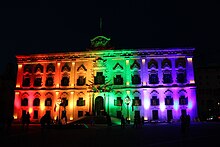LGBTQ rights in Malta
[2][3][4][5] Throughout the late 20th and early 21st centuries, the rights of the LGBTQ community received more awareness and same-sex sexual activity was legalized on 29 January 1973.
According to the Overseas Security Advisory Council (OSAC), Malta has been recognised for providing a high degree of liberty to its LGBT citizens.
[11][12] In late 2020, Malta joined the UN LGBTI Core Group, an international platform for the protection of LGBT people from violence and discrimination.
[20] During the rule of the Order of St John, sodomy was considered a common practice in Malta, and generally associated with Italians and Muslims.
[21] Towards the 17th century, there was harsh prejudice and laws towards those who were found guilty or speak openly of being involved in actual or perceived homosexual behaviour.
[22] The Scottish voyager and author William Lithgow, writing in March 1616, reported that a Spanish soldier and a Maltese teenage boy were publicly "burnt to ashes" for confessing to have practised sodomy together.
[21] An uncommon case, heard at the Castellania in 1774, involved an intersex person, 17-year-old Rosa Mifsud from Luqa, who petitioned for a sex change by dressing as a man.
[26] The politician Joseph Flores, who served during the 1950s as Deputy Leader for the Maltese Labour Party, was thought to have had a relationship with the editor and author Herbert Ganado since meeting at university in the 1920s.
A prominent case was that of the British Sub-Lieutenant, Christopher Swabey, who was court-martialed and dismissed from post in 1956; the prosecution was later over-turned after referral to the House of Lords.
[33] In February 2008, MGRM organised and presented a petition to Parliament asking for a range of measures to be introduced to protect LGBT people through the law.
The petition was signed by more than 1,000 people and asked for legal recognition of same-sex couples, an anti-homophobic bullying strategy for the island nation's schools and new laws targeting homophobic and transphobic crimes.
[53] In March 2016, Prime Minister of Malta and leader of the governing Labour Party Joseph Muscat stated at an International Women's Day event he was personally in favour of legalising same-sex marriage in the country and that it was "time for a national debate" on the issue.
[54] The country's leading gay rights organisation subsequently called for a bill to be put forward opening up marriage to all couples irrespective of gender without delay.
[66] On 7 September 2015, Prime Minister Muscat announced that the government would introduce a bill to grant in vitro fertilisation (IVF) access to lesbian couples.
[85] In June 2012, Parliament amended the Criminal Code to provide penalty enhancements to hate crimes motivated by the victim's sexual orientation or gender identity.
[86][87][88] On 14 April 2014, the Parliament of Malta unanimously approved a bill which amended the Constitution to add protections from discrimination on the basis of sexual orientation and gender identity.
[101] In December 2016, the Act was amended to allow minors who are sixteen and over to have their gender changed without needing to file an application in court or obtain parental approval.
However, in September 2022, the prime minister of Malta made an announcement that sexual reassignment surgery will be free - but is yet to provide more details such as when the new policy would go into effect.
[103][104][105][106] In July 2024, legislation was officially passed to implement a non-binary option alongside male and female on an individual’s birth certificate and went into effect in September 2024.
Applicants can also change their official documents by simply filing an affidavit with a notary without any requirement for medical gender reassignment procedures.
[113] Primary healthcare in Malta is available freely for everyone, including LGBT people with specific protections from discrimination on the basis of sexual orientation.
[115] In May 2016, Minister for Health Chris Fearne announced that a technical committee set up in 2015 to review that ban had recently completed its report and recommended scrapping the current indefinite deferral on donations.
[117][118][119] Since September 2022, gay and bi men can legally donate blood within Malta after having at most one sexual partner within the last four months, the same applied to heterosexual people.
[120] On 16 June 2015, Civil Liberties Minister Helena Dalli announced that the government planned to introduce a bill to ban conversion therapy on minors.
A 2015 EU-wide survey, commissioned by the Fundamental Rights Agency, showed that 54% of gay people in Malta felt comfortable holding their partner's hand in public, though only 40% were out at their workplaces.
[134][135] In 2015, the donation of reading material by the Malta Gay Rights Movement, that contained the teaching of diverse families, including same-sex parenting,[136] to the Education Department caused some controversy.
[139] The minor parties, which are mostly right-wing or far-right (e.g. Alleanza Bidla, Moviment Patrijotti Maltin and Imperium Europa) are against LGBT rights.
Gay men from over 120 countries were asked about how they feel about society's view on homosexuality, how do they experience the way they are treated by other people and how satisfied are they with their lives.
A survey published in January 2020 showed that 56% of LGBT respondents felt unsafe in Paceville, known for its frequent fights and violent incidents.
[145] The 2023 Eurobarometer found that 74% of Maltese thought same-sex marriage should be allowed throughout Europe, and 78% agreed that "there is nothing wrong in a sexual relationship between two persons of the same sex".




